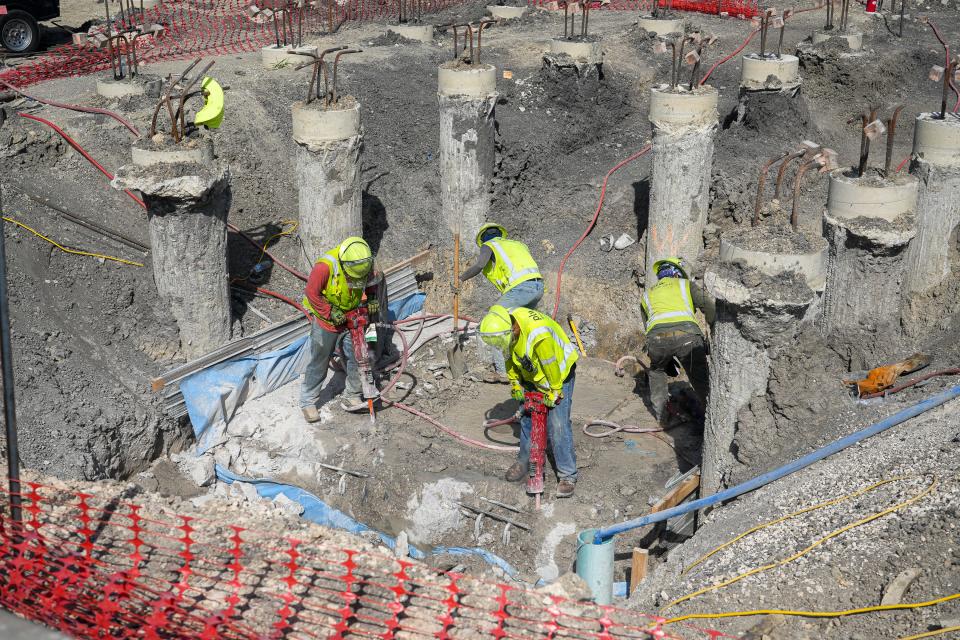Editorial: Canceling heat breaks for outdoor workers is cruel
Imagine pounding asphalt shingles onto a roof or digging trenches for new pipes in Texas with a scorching summer sun beating down on you all day. Now imagine doing that strenuous work without regular breaks for water and shade.
That’s the dangerous new reality facing outdoor laborers in Texas on Sept. 1 when a new state law takes effect, nullifying local ordinances requiring heat breaks for certain outdoor workers, including those on construction sites. The Texas Regulatory Consistency Act—derisively dubbed the death star law by critics—will also override local rules protecting tenants from eviction or guaranteeing other employment benefits, as well as a number of city ordinances related to finance, insurance and property codes. The cities of San Antonio and Houston have sued the state, arguing that the law is an unconstitutional intrusion on local rulemaking. Austin, a frequent target of the Republican-controlled Texas Legislature on local control issues, has not joined the lawsuit, deciding to let other cities take the lead.
Nullifying local protections for heat protection is dangerous
State Rep. Dustin Burrows, a Lubbock Republican who introduced the bill Abbott signed in June, says it will rein in a patchwork of local regulations that is difficult and expensive for companies operating in multiple cities to navigate. If that's the case, the state could provide regulatory consistency and protect workers by mandating heat breaks for construction workers in all cities and counties. There would be no confusion then.
The new state law nullifies local laws in Austin and Dallas requiring 10-minute breaks for water and shade for construction workers. Canceling mandatory water breaks is an unwise and cruel decision that risks human lives and puts profits above safety of the workers who make the profits possible. If the state insists on preempting local ordinances protecting workers from heat-related dangers on the job, the federal government should step in.
We urge the Texas congressional delegation to support the Asuncíon Valdivia Heat Illness, Injury and Fatality Prevention Act, which would require the U.S. Occupational Safety and Health Administration to adopt standards protecting workers in high heat with paid breaks in air-conditioned or shaded spaces, access to water and limitations on time exposed to heat. Toiling in extreme heat without breaks can lead to heat cramps, heat exhaustion, and heatstroke, and aggravate existing problems such as heart disease. As Texans know all too well, prolonged exposure to heat can also lead to death. Fifty-three Texans died of heat-related stress last year, by far the most in the nation.
In July, Texas set a new heat record with 10 straight days above 105 degrees. The month of July was the hottest on record, and the state’s climatologist predicts sweltering summers will become more brutal, with the number of 100-degree-plus days expected to double by 2036.
Supporters of the new state law, including construction industry groups that lobbied hard for its passage, say it doesn’t prevent employers from offering heat breaks—only that they can’t be mandated. They contend that companies that don’t allow for heat breaks won’t be able to recruit and retain employees in Texas’ competitive construction economy.
A safe workspace is a fundamental right
If a patchwork quilt of local laws is an obstacle for businesses, why not create and mandate statewide safety standards for breaks? A safe workplace is a fundamental human right, and the nullification of local ordinances designed to protect outdoor workers from heat-related illness and death in Texas is an egregious breach of this humanitarian principle. Even if it is not by design, repealing local laws mandating water breaks for outdoor workers is discriminatory because it weighs most heavily on minority construction workers. In Texas, Hispanics comprise 61% of the construction labor workforce, the highest percentage of any state in the nation. HB 2127 devalues the humanity of Hispanic workers and the immense contribution they make to Texas' robust building industry.
Canceling mandatory water breaks in cities is drawing more negative attention to a state already under heavy criticism for its perceived cruelty, including allegedly denying water to distressed migrants trying to navigate the Rio Grande, and not providing air conditioning in state prisons where indoor temperatures routinely soar beyond 110 degrees in summer.
In July, President Biden directed the Department of Labor to increase heat-safety inspections in outdoor workplaces like construction sites and farms, and called out policies that deny workers breaks from the heat.
"I mean what are we doing here? What's going on with some of this stuff," Biden said.
Common sense compels us to wonder the same thing. It's a question that state legislators and the governor would be wise to consider as they crow about Texas' economic and population growth but deny safety protections to those who help make it a reality.

This article originally appeared on Austin American-Statesman: Editorial: Texas rescinds local heat protection laws for workers

